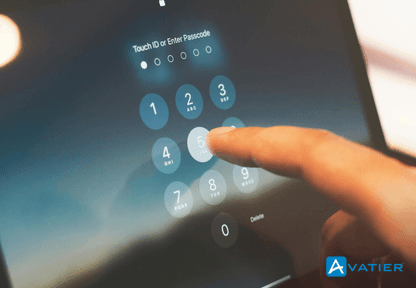July 18, 2025 • Mary Marshall
MFA Implementation: Best Practices for Enterprise
Maximize your enterprise security with these MFA implementation best practices using Avatier for seamless protection and management.
Robust security measures are non-negotiable for enterprises safeguarding sensitive data and proprietary information. One of the most effective strategies for enhancing security is the implementation of Multi-Factor Authentication (MFA). Avatier, a leader in identity and access management, provides comprehensive MFA solutions tailored to meet enterprise security needs combining security with ease of use, leveraging automation and AI-driven enhancements.
Understanding the Importance of MFA
Multi-factor authentication is a security protocol that requires users to present multiple pieces of evidence to verify their identity. This typically includes something they know (a password), something they have (a phone or security token), and something they are (biometrics). According to a recent study by Microsoft, enabling MFA can block over 99.9% of account compromise attacks, showcasing its effectiveness in safeguarding enterprise data.
Industry Trends and Statistics
As cyber threats continue to advance, so do the methods of implementing security measures. Research shows that by 2025, the global MFA market is expected to reach $17.76 billion, growing at a CAGR of 18.3% from 2020 to 2027 (MarketsandMarkets). Companies like Okta and Ping Identity have already integrated advanced MFA solutions to enhance security, but Avatier’s MFA implementation stands out due to its unique approach in enhancing user experience without compromising security.
Key Benefits of MFA with Avatier
Avatier’s MFA solutions are built on several key principles that ensure consistency in securing enterprise access:
User-Friendly Interface: Avatier provides a seamless, self-service interface that allows users to efficiently navigate MFA processes without extensive training.
Scalable Solutions: Built for scalability, Avatier’s MFA can be seamlessly integrated into existing systems regardless of size, supporting both on-premise and cloud-based environments.
AI-Driven Security Enhancements: To stay ahead of potential threats, Avatier leverages AI to enhance its security measures, actively monitoring and adapting to new threat vectors.
For enterprises seeking a comprehensive MFA solution, Avatier’s Identity Management Anywhere includes multifactor integration, exemplifying its commitment to providing straightforward, effective, and comprehensive MFA solutions. Learn more about their multifactor integration features.
Implementing MFA: Best Practices
MFA implementation requires careful planning and execution. Here are some best practices for implementing MFA in your enterprise:
1. Assessment and Planning
Begin with a thorough assessment of your business needs. Determine which resources require protection and the level of security needed. Avatier offers managed security solutions to conduct thorough assessments and tailor security protocols according to your specific requirements.
2. Choosing the Right Authentication Factors
Select authentication factors that are secure yet convenient for your users. Common methods include SMS-based OTPs, authenticator apps, and biometric verification, which can be integrated through Avatier’s identity and access management solutions.
3. Simplifying User Experience
Optimize the user experience by simplifying authentication processes. Consider offering single-sign-on (SSO) that supports MFA for increased efficiency and enhanced user satisfaction. Avatier’s single sign-on solutions provide a seamless approach to integrate SSO with MFA.
4. Educating Users
Ensure users understand the importance of MFA and are educated on how to use it effectively. This can help reduce resistance and enhance security awareness across the organization.
5. Continuous Monitoring and Adaptation
Implement continuous monitoring to identify potential security threats in real-time. Avatier’s AI-driven analytics tools help assess threats and adapt security protocols dynamically to maintain a high-security posture.
Addressing Common MFA Challenges
Implementing MFA may accompany some challenges:
User Friction: Introducing additional verification steps can be perceived as cumbersome. Strategies for minimizing this friction involve educating users and implementing smooth UX designs.
Implementation Complexity: Integrating MFA into existing systems can be complex. Avatier addresses this by offering tailored support and integration services to ensure a smooth rollout.
Cost Implications: Initial setup costs and potential downtime during implementation can affect short-term budgets. However, investing in future-proof security protocols to protect against breaches far outweighs these costs.
Conclusion: Elevating Security with Avatier
For enterprises prioritizing security and streamlined access, Avatier offers robust MFA solutions equipped with the latest AI and automation technologies. Incorporating these best practices will not only improve security but also optimize user experiences, essential in today’s rapidly evolving digital ecosystem.
Explore Avatier’s comprehensive suite of solutions to take the next step in bolstering your security framework with multi-factor authentication. Discover why leaders are choosing Avatier to protect their data and simplify their identity management processes.
With the right MFA practices and tools, your enterprise can achieve enhanced security, compliance, and peace of mind.









